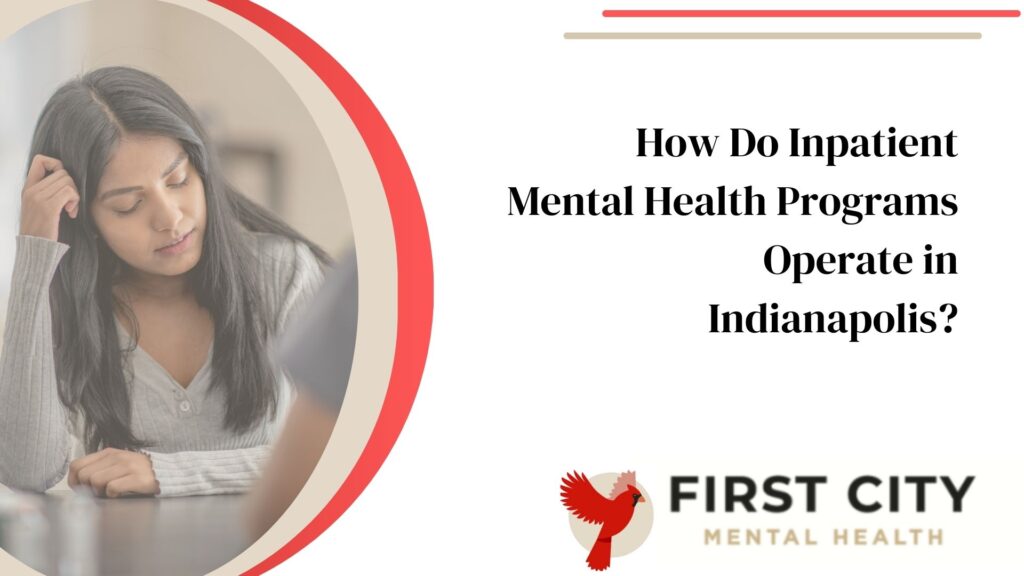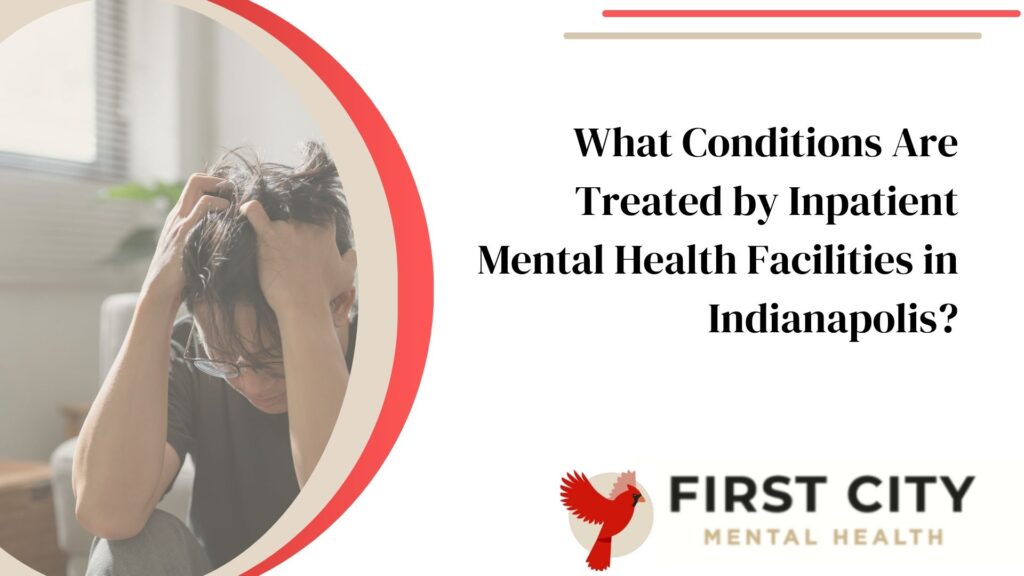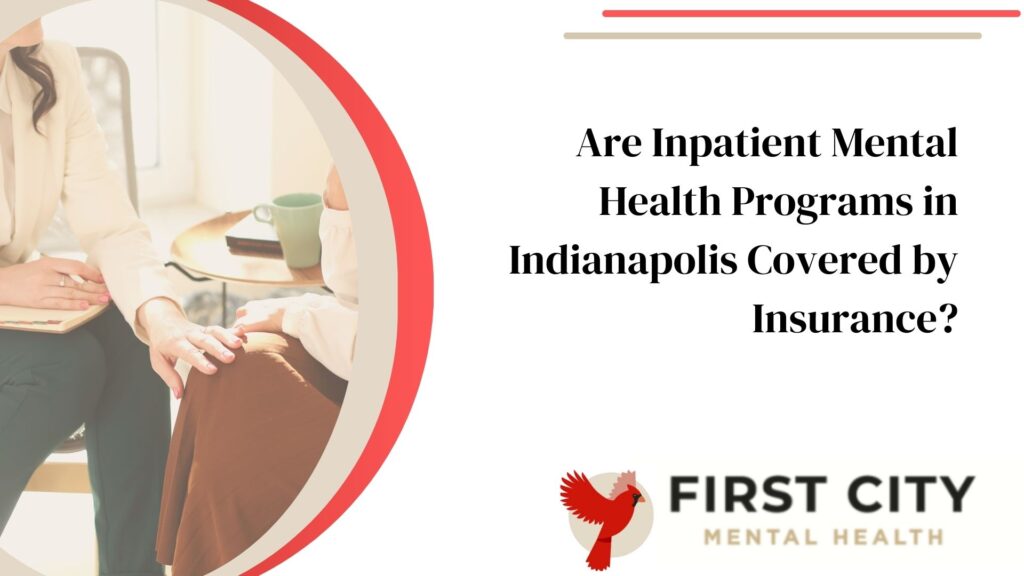
Finding the Right Residential Program at First City Mental Health Center Post-Stabilization
January 15, 2025
How to Find an IOP in Indianapolis?
January 15, 2025Inpatient mental health Indianapolis care is one element in helping those who require intensive treatment. It offers a supervised environment where patients have 24/7 medical attention.
Indianapolis has excellent inpatient offerings if you need them. These locations offer a safe place to heal and grow. They help people with serious mental health issues. The programs are geared toward different needs. A lot of people get the care they need right here.
We also explore how these services work and what they offer. The more you understand your options, the better you can choose the right path. Whether it’s for you or someone you know, there’s a lot of power in knowing more.
Now, let’s talk about what Indianapolis has to offer for mental health care.
Key Takeaways
- Inpatient mental health care in Indianapolis is a more intensive treatment option for people who are in urgent need. It provides support for people with mental health conditions in a holistic way.
- These programs work inside specialized settings that provide 24-hour care, a highly structured environment, and a variety of therapeutic interventions.
- People with more intense mental health symptoms, in crisis, or in need of stabilization may find inpatient services beneficial.
- Facilities treat a range of mental health conditions, including depression, anxiety disorders, bipolar disorder, schizophrenia, and more.
- Inpatient treatment provides a safe environment, 24/7 medical care, and a tailored care plan.
What Is Inpatient Mental Health Care in Indianapolis?
Understanding Inpatient Mental Health Care
Indianapolis inpatient mental health care is a structured program where people stay at a facility to receive treatment.
Here in Indianapolis, we have a number of facilities that offer this care. These centers are clearly a safe haven for people suffering from acute mental health disease.
Patients receive 24/7 support from a team of professionals. This team can include psychiatrists, therapists, and nurses who collaborate to develop an individualized treatment plan.
The goal is to stabilize the patient and help them cope.
Key Features of Inpatient Care
One major component of inpatient care is the intensive therapy sessions. These can include individual counseling, group therapy, and family therapy. Each session is tailored to the patient’s needs.
Another important aspect is medication management. Medications can help many patients manage their symptoms. The healthcare team closely monitors these medications to ensure they are effective and can adjust dosages as needed.
Benefits of Choosing Inpatient Care
There are a number of benefits to choosing inpatient care. It offers a protected space that’s a million miles away from everyday stresses. This allows patients to focus on getting better.
The access to medical professionals can also be reassuring, both for the patient and her family. For many, this level of care leads to faster, more sustainable recovery.
How Do Inpatient Mental Health Programs Operate in Indianapolis?

Treatment Process and Duration
The best inpatient mental health facilities in Indiana, like First City Recovery Center, will have a specific treatment plan.
This plan is usually from 30 to 90 days and guides patients through the recovery. Depending on what each patient needs, this plan can vary.
The programs are full service, including medication management and therapy. For example, First City Recovery also provides an eight-week treatment program, so you know every aspect of care is covered.
Having that more well-rounded approach helps patients along all the different stages of their recovery process.
Professional Team and Individualized Care
In Indianapolis, these programs often include a team of experts who work together. Therapists, counselors, and medical doctors work together to provide personalized treatment.
Allison Pugh brings 18 years to her critical role at First City Recovery. She wants the organization to maintain the highest standards.
This teamwork ensures that patients receive individualized attention when needed, so that the treatment is customized to each patient’s unique needs and goals.
Community Involvement and Holistic Approach
Community involvement is a large aspect of these programs. Staff members, including Nathan at First City Recovery, participate in local efforts like the Drug-Free Howard County council. This fosters a supportive environment for recovery.
Programs also emphasize whole-person care, like lifestyle medicine in addition to therapy and medications. This helps patients build a balanced life, promoting long-term recovery.
Who Can Benefit from Inpatient Mental Health Services in Indianapolis?
Teens and Adolescents
Teens 12-17 struggling with dual diagnoses such as depression, anxiety, trauma, or substance use will do well in a safe and nurturing environment. We provide very good adolescent inpatient mental health facilities Indiana.
These facilities provide specialized programs to address ADHD, self-harming behaviors, and suicidal thoughts. It’s really about creating a nurturing environment where young people can process all of that.
For instance, teens dealing with high-risk behaviors receive specific care to ensure they’re able to stabilize and start healing.
Adults and Adolescents in Crisis
For adults and adolescents, especially those between 13 and 17 years old, facing psychiatric emergencies, inpatient services can provide advantages.
These programs are designed to provide both crisis stabilization and medical detoxification. Individuals receive immediate assistance to get them stabilized mentally. They also kick off the detox with monitored and controlled processes.
For those with a dual diagnosis, addiction treatment combined with mental health support provides comprehensive care.
Women and Girls with Eating Disorders
Facilities such as Selah House offer inpatient services for women and girls ages 12 and up who are fighting eating disorders.
These programs provide a nurturing environment with body image, nutrition, and healthy coping therapies.
The point is to enable those individuals to overcome challenges and create a better relationship with food and themselves.
Young Men with Compulsions and Addictions
Anyone 14–26 years old is welcome who struggles with compulsions, addictions, or self-destructive behaviors. Places like Capstone Treatment Center provide the support they require.
These inpatient programs take a focused approach to young men’s support. They help them identify underlying issues and develop effective strategies for positive change.
The environment encourages personal growth and the development of healthier life choices.
What Conditions Are Treated by Inpatient Mental Health Facilities in Indianapolis?

Substance Use Disorders and Co-occurring Disorders
Inpatient mental health facilities in Indianapolis address substance use disorders. These facilities often treat higher-level cases with co-occurring disorders.
Co-occurring disorders happen when a person has a mental health issue. At the same time, they suffer from a substance use disorder.
It’s very common—it’s like nine times out of 10 people who have mental illness also have substance use challenges.
Allison Pugh, an expert with 18 years at First City Recovery Center, is a key player in these treatments. Her knowledge and skills greatly enrich the care of patients.
They work closely with patients to customize recovery plans that take into account both aspects of their health.
Common Mental Health Disorders
These facilities target more well-known mental health conditions like depression, anxiety, and bipolar disorder.
Professionals such as Lindsay are masters of medicating. They care for a broad spectrum of patients, from age six and up.
This ensures that kids receive the proper medication and treatment for their symptoms. It also provides adults with the therapeutic care they need to manage their conditions.
By addressing these conditions, these centers return patients to a place of stability and quality of life.
Behavioral Health and Specialized Programs
Inpatient facilities can treat a range of behavioral health problems. These include trauma, ADHD, and eating disorders, in addition to mental health disorders.
They realize that everyone’s needs are different. That’s why they offer specialized programs targeting specific groups, including veterans, homeless people, and those with intellectual and developmental disabilities.
This inclusive approach means everyone gets the support they need, regardless of their background or particular challenges.
What Are the Benefits of Inpatient Mental Health Treatment in Indianapolis?
Personalized Care and Support
When we think about inpatient mental health treatment, personalized care is a top benefit. That means treatments are individualized to meet each person’s unique needs.
In Indianapolis, facilities offer myriad therapies. From talk therapy to medication management, each option is designed to address particular mental health challenges. We find that this individualized approach helps people understand their conditions better and guides them toward recovery.
Structured Environment
Inpatient treatment offers a focused environment that is essential for individuals who require the highest level of care.
This structure consists of daily routines, therapy sessions, and group activities, providing a stable environment.
In Indianapolis, these programs give people a schedule to work off of, which takes away some stress and allows them to focus on healing.
The structured setting also minimizes distractions and potential triggers, offering a safe space for recovery.
Access to Professional Resources
Inpatient centers in Indianapolis provide access to a variety of professional resources. This includes psychiatrists, psychologists, and trained mental health workers, all in collaboration.
Just having access to these experts ensures people get immediate attention.
It also enables ongoing monitoring, which is key to successful treatment. This collaborative environment ensures all aspects of a person’s mental health are addressed.
What Types of Therapy Are Offered in Indianapolis Inpatient Mental Health Care?
Group Therapy
In inpatient mental health facilities Indianapolis. It connects people who have had similar experiences in a supportive environment. This form of therapy promotes sharing and learning from each other.
For example, at First City Recovery Center, recovery groups are popular. These groups allow us to find others who share our struggles and successes. Having a space where everyone is working toward similar goals can be incredibly motivating.
Individual Therapy
Individual therapy is another primary therapy type in Indianapolis inpatient treatment. The one-on-one nature allows for individual treatment plans.
At facilities like Sandra Eskenazi Mental Health Center, therapists tailor sessions to meet specific needs. Individual therapy provides a dedicated space for self-development.
It effectively treats severe mental illnesses and substance use disorders. It’s an opportunity to get down to the nitty-gritty of our mental health struggles with experienced professionals to guide us through.
Medication Management
Medication management is essential to the treatment of mental health conditions. Lindsay specializes in this area, helping manage a range of diagnoses for individuals aged 6 and older.
This is a service that ensures we get the correct medication at the correct dose. It’s not just prescribing drugs, but monitoring our progress and adjusting treatment as necessary.
First City Recovery Center also offers medication management, which is an important part of their holistic care approach.
Family Therapy
Family therapy is part of the inpatient care spectrum in Indianapolis. It engages family members in the healing process.
This is an approach that recognizes that issues with mental health don’t affect just us, but also our people.
By having family included in therapy, we can create better communication and understanding at home. It helps us rebuild and strengthen those relationships, which in turn gives us a real support system for our needs as we learn to recover.
How Much Does Inpatient Mental Health Care Cost in Indianapolis?
Understanding the Costs
Inpatient mental health facilities care costs in Indianapolis can vary significantly. It’s important to know these differences when reviewing your options.
How much does treating mental health issues normally cost in the U.S.?
That also depends on what kind of care you need. For instance, a typical 30-day program can run from $15,000 to $60,000. This means that there’s a wide range in how many sessions one person needs compared to the next.
Inpatient treatment ranges from $500 to $2,000 per day. This is much higher than outpatient therapy, which typically costs between $100 and $200 per session.
Insurance Coverage
Whether insurance will cover these costs is an important consideration. Many large insurers — such as UnitedHealthcare, Cigna Health, Aetna Insurance, and Blue Cross Blue Shield — typically cover inpatient mental health services.
This support ensures patients can get the care they need during difficult periods. With insurance, you can drastically reduce your out-of-pocket expenses. According to Mental Health America, approximately 1% of adults with mental illness, over 5.5 million people, are uninsured. This lack of coverage makes it much more difficult for them to access care. As always, check with your insurance provider to see what’s covered.
Local Options in Indianapolis
In Indianapolis, Eskenazi Health partners with a number of health insurance carriers to accept different plans. This could help make treatment more accessible for those who have insurance.
To get a more accurate picture of costs, contact local providers. Places like AMFM can provide thorough information and address specific questions regarding what costs per day or what out-of-pocket costs may be.
Are Inpatient Mental Health Programs in Indianapolis Covered by Insurance?

Understanding Insurance Coverage
As you look for insurance coverage for mental health facilities Indianapolis, keep in mind that the majority of insurance plans offer some level of coverage. This knowledge can have a substantial impact on your access to needed care.
The details vary quite a bit. Many plans, especially those under the Affordable Care Act, provide mental health services. You should always check the specifics of your policy to know what is covered.
Some will pay a portion of the cost, and some will have you pay a deductible or copay. It’s important to speak with the insurance provider so you have an understanding of what is and isn’t covered.
Conclusion
We explored best inpatient mental health facilities in Indiana. Each has its own unique support for people in need. These facilities focus on healing and growth. They offer a safe place to heal.
The diversity of therapies means patient care is tailored. We had a taste for the benefit and for the cost, which was insurance coverage. It is for many, and it’s clear that help is out there.
If you know someone who might find this helpful, pass it along. I just took that first step. Don’t go it alone when it comes to the challenges.
Contact a local facility and begin the road to a healthier tomorrow. We all deserve a stake in getting to thrive. Let’s make mental health a priority and embrace the support available.
Frequently Asked Questions
What is inpatient mental health care?
Inpatient mental health care means staying at a facility for treatment. Patients are offered 24/7 supervision and support from mental health professionals. This is the ideal setting for those requiring immediate intervention.
How long does inpatient mental health treatment last?
The length of treatment can vary depending on individual needs and conditions. Usually, the stays last a few days to several weeks. The care team determines how long you’re supposed to stay each time.
Are family members allowed to visit during treatment?
Yes, family visits are allowed at most facilities. Visiting hours and policies vary, so check with your specific facility. Family involvement can be an important part of the recovery process.
What should patients bring to an inpatient facility?
Patients should take personal hygiene items, loose-fitting clothing, and prescribed medications. Facilities often have restrictions on electronics and personal items, so consult the facility’s guidelines.






